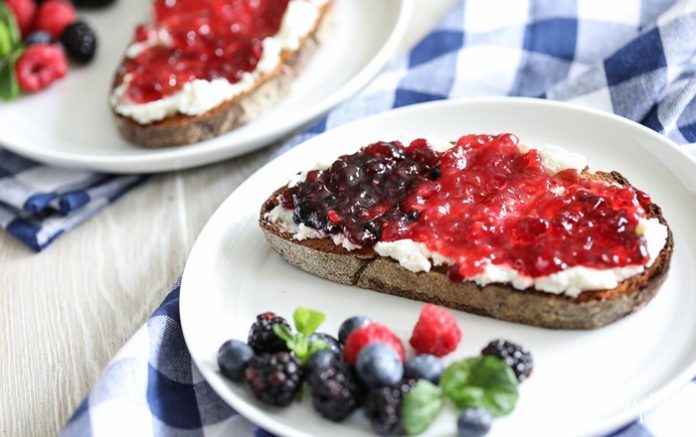It does not matter if you are on a diet, no one can eat a plain toast for breakfast. I usually dress up my toast with some kind of spread that I choose based on its quantity and the quality. There are important questions to ask yourself like which spreads to use? And how much? This is to reduce the calories and ensure your breakfast is nutritious.
Margarine: Some people prefer this spread as it is a better choice to butter. However, when you pick a margarine product, make sure it is made from a healthier oil, like olive oil, and this will ensure you benefit from a dose of heart-healthy fats (the mono- and poly- unsaturated kind). These healthier fats can even help to raise HDL cholesterol.
Now, margarine may be considered a healthier choice, but it is still a fat and so use it sparingly.

Cream cheese: You are mistaken for thinking cream cheese is a good daily dairy serving for your breakfast. This is because cream cheese contains much more fat than calcium. If you like it, go for the light one instead. 1 tablespoon of Regular: 50 calories, 5 g of fat, 12 mg of calcium.
Light: 30 calories, 3 g of fat, 12 mg of calcium.

Labne: I love Labne in the morning with some zaatar, lettuce and olives. It is a good option to start your day with, while getting the vitamin D and calcium dose. Another way to eat it is with fresh jam, pistachios and a sprinkle of sea salt.
One tablespoon of low-fat Labne has 90 calories.
Nutella: Nutella is marketed as a healthy breakfast choice for children. Of course it contains more than 50 hazelnuts per jar, but they do not tell you that it contains much more sugar and fat than hazelnuts. It is fine to enjoy Nutella once in a while but do not think about it as a healthy breakfast option. One tablespoon contains 100 calories and 6 g of fat. If you want to enjoy it as a healthy breakfast option, learn to make a healthy option from an online recipe.

Peanut butter: It provides carbohydrates, proteins and monounsaturated fatty acids (good fat) which lowers LDL (bad cholesterol), and increases HDL (good cholesterol). Peanut butter also contains vitamin E and magnesium. While peanut butter is a healthy option, you should still eat it in moderation. Even though its fat is considered good for the heart, it is still considered as fat and fat has calories 1/2 1 tablespoon contains 95 calories 8 g of fat.
Jam: Jam can be a refreshing sweet topping on toast for breakfast, but do not take it as a fruit substitute. Jam contains a lot of sugar, mainly glucose, not fructose that is found in fruits. 1 tablespoon contains 50 calories and 0 g fat.
Honey: I recommend savoring the natural organic one, especially during the flu season. 60 calories has 0 g protein.
To subscribe to my diet programs, don’t forget to log in to: www.eatlikemira.com


















